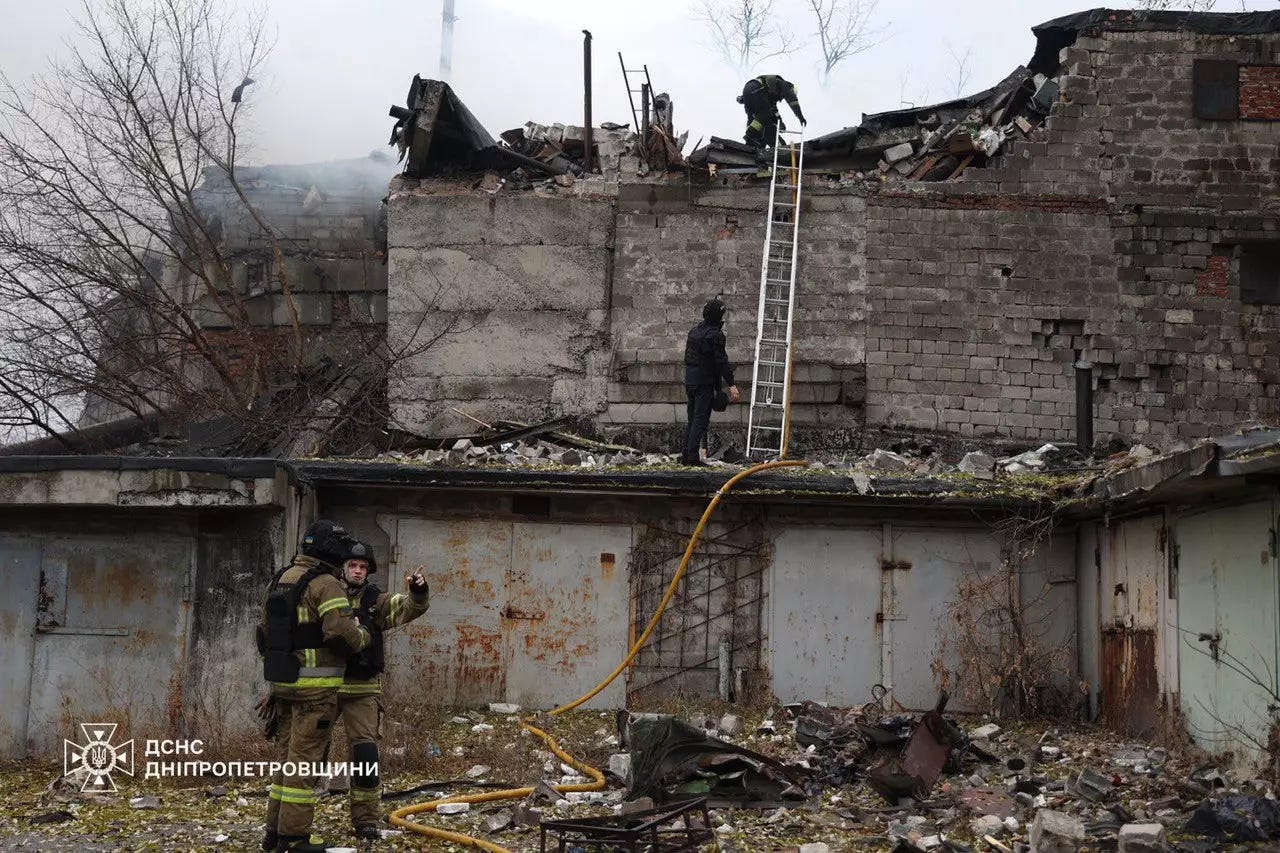Russia recruits Yemenis to fight in Ukraine, Putin threatens a base in Poland, and Orbán defies ICC warrant against Netanyahu
November 18-24 in Eastern Europe

What You Need To Know:
This roundup combines last week’s top news with important underreported stories
1. Ukraine fired American and British long-range missiles into Russia as Moscow seized territory in Kursk and recruited Yemeni soldiers
After the Biden administration gave Ukraine the green light to use long-range weapons against Russia, Ukrainian forces fired eight American ATACMS missiles at Russia’s Bryansk Oblast, followed by several British Storm Shadow missiles shortly afterward. Russia in turn responded by firing an experimental hypersonic missile modeled on nuclear-capable ICBMs on the Ukrainian city of Dnipro, after which Putin stated more of such strikes would take place in the event of further “escalations.” Meanwhile, reports indicated that Ukraine had lost nearly 40% of the land it had captured in Russia’s Kursk in August, while Russia was found to have been recruiting mercenaries from Yemen through a murky Houthi-affiliated group.
Why it matters: As Russia and Ukraine continue to prepare for the disruptive impact of Trump’s return to power in the US, their use of ever-more destructive and advanced weapons is only a symptom of the inevitable rise in the conflict’s temperature as both militaries make a dash for the finish line. Russia’s apparently successful focus on Kursk showcases that Putin is seeking to take away any potential cudgels Ukraine might use for land-for-land swaps at the negotiating table. As the war barrels toward this eventual climax, Russia’s coercion of Yemeni fighters to join its ranks demonstrates how internationalized the conflict has become especially on Moscow’s side, which is now reliant on North Korean soldiers and Iranian drone technology to support its war effort. Looking comprehensively though, Ukraine’s use of long-range weapons against Russian territory is unlikely to change the realities of the conflict at this stage, but may provide it with at least some level of deterrence against future Russian aggression after an eventual peace settlement.

2. Russia designated the first permanent US base in Poland as a ‘priority’ target as it changed its nuclear doctrine
Following America’s opening of its first permanent missile defense base in Poland earlier this month, Russia called the installation in the town of Redzikowo as a “priority target for potential neutralization,” claiming it raised the overall nuclear risk for Russia — a notion Polish officials have dismissed as absurd. This comes after Russia recently updated its nuclear doctrine to state that a conventional attack on Russia by a non-nuclear power backed by nuclear states would justify a retaliation with nuclear weapons against Ukraine or NATO facilities.
Why it matters: Russia’s new nuclear doctrine lowers the threshold for the use of weapons of mass destruction, in theory raising the probability of a world war between it and NATO. In the context of Russia’s extensive nuclear threats against the West in the recent past though, such statements are yet another attempt by Moscow to dissuade the US and Europe from supporting Ukraine, and there remains little chance that Russia would realistically choose to strike Ukraine with nuclear warheads or carry out any sort of attack against NATO bases in places like Poland. More importantly however, what statements like this show is that the eventual conclusion of the war in Ukraine will almost certainly not lead to a thaw in Russia-NATO relations even if the US draws down its military presence in Europe, as bases like the one at Redzikowo will likely remain operational while states like Poland and Romania continue to view bellicose Russian rhetoric on NATO military infrastructure as a national security threat.
3. Hungary’s Orbán invited Netanyahu to Hungary after the ICC issued an arrest warrant against him
Following the International Criminal Court’s issuance of an arrest warrant against Israeli Prime Minister Benjamin Netanyahu for war crimes committed in Gaza, Hungary’s PM Viktor Orbán invited the Israeli leader to Hungary, stating he would defy the ruling and would not arrest him upon arrival, as Hungary is obligated to do as a signatory of the Rome statute. This puts Hungary at odds with other EU states like the Netherlands, Italy, and Spain that have vowed to uphold the ICC’s warrant.
Why it matters: Orbán sees a kindred spirit in Netanyahu, who like him has been accused of undemocratic behavior, corruption, and illiberal tendencies at home and abroad. Although the ICC’s warrant against Netanyahu presents serious diplomatic challenges for various European states that have maintained close relations with Israel, Hungary’s open defiance of the ICC further cements it as a pariah within the Western political order that is comfortable flaunting international institutions in pursuit of its own political agenda, which includes building an international populist, right-wing coalition across Europe and beyond.
4. Poland’s primary political parties finalized their candidates ahead of the country’s pivotal presidential election in May
After weeks of political maneuvering, Poland’s largest political parties have announced their candidates in the country’s upcoming presidential elections, set to take place in 2025, with the ruling centrist Civic Coalition nominating Warsaw mayor Rafał Trzaskowski, and the previous right-wing ruling Law and Justice Party nominating Karol Nawrocki, the former head of Poland’s Institute of National Remembrance. Trzaskowski edged out Poland’s Foreign Minister Radosław Sikorski for the nomination, who had promised to use his foreign policy experience to help Poland weather the difficult years ahead under Trump’s leadership in the US.
Why it matters: PM Donald Tusk’s ambitious agenda to rid Poland’s government of Law and Justice’s undemocratic and illiberal legacy has often been stifled by the continued tenure of conservative President Andrzej Duda, whose exit from office in 2025 offers Tusk and the Civic Coalition a chance to elect an ally to rubber stamp their reforms into law. But Poland’s presidential election will have consequences far beyond the country, and is widely seen as a litmus test for the ability of European countries to roll back the effects of rule by populist strongmen like Orbán and Slovakia’s Fico. Locally in Poland, the vote is also viewed as a referendum on Law and Justice’s political future, which is on shaky ground given its extensive financial woes.
5. A far-right, pro-Russian candidate won the first round of voting in Romania’s presidential election, shocking the country
Following the first round of voting in Romania’s presidential elections, Kremlin-friendly ultranationalist Calin Georgescu took the lead with 23% of the vote following a campaign largely conducted on TikTok that featured statements of support for Romania’s Iron Guard, a fascist movement in the country during World War II. Georgescu is set to face-off against center-right candidate Elena Lasconi in the second round of voting on December 8, shortly after parliamentary elections take place in Romania on December 1.
Why it matters: Georgescu’s win in this first round is being interpreted as a powerful statement against Romania’s political establishment, despite his lack of any clear platform. His anti-NATO position and his dismissal of a NATO base in Romania as a “disgrace” was well received in Russia, and although the presidency is largely ceremonial in Romania, Georgescu would have significant influence over the country’s foreign policy if elected. If he wins the second round, his elevation to the presidency could present serious risks for Romania’s role as a defense leader in NATO and for security along the alliance’s eastern flank in general.
Other stories to watch:
— Exclusive: Trump considers ex-intelligence chief Richard Grenell for Ukraine post, sources say (Reuters)
— Albanians in Serbia Slam Top Court for Approving ‘Address Passivisation’ (Balkan Insight)
— Austria lifts long-held veto on the Schengen accession of Romania and Bulgaria
— Poland and Slovakia to sign agreement on ammunition production in 2025 (Reuters)
— Lithuania’s Next Premier Open to Restoring China Diplomatic Ties (Bloomberg)
— Belarus opposition fears for former Ukraine volunteer extradited by Vietnam (Reuters)
— Police in Georgia break up protesters’ camp in Tbilisi but they quickly return (Associated Press)
— Hungary ready to quit Russian oil — for a price (Politico Europe)
— Serbia arrests 11 as anger surges over roof collapse at train station (Al Jazeera English)



